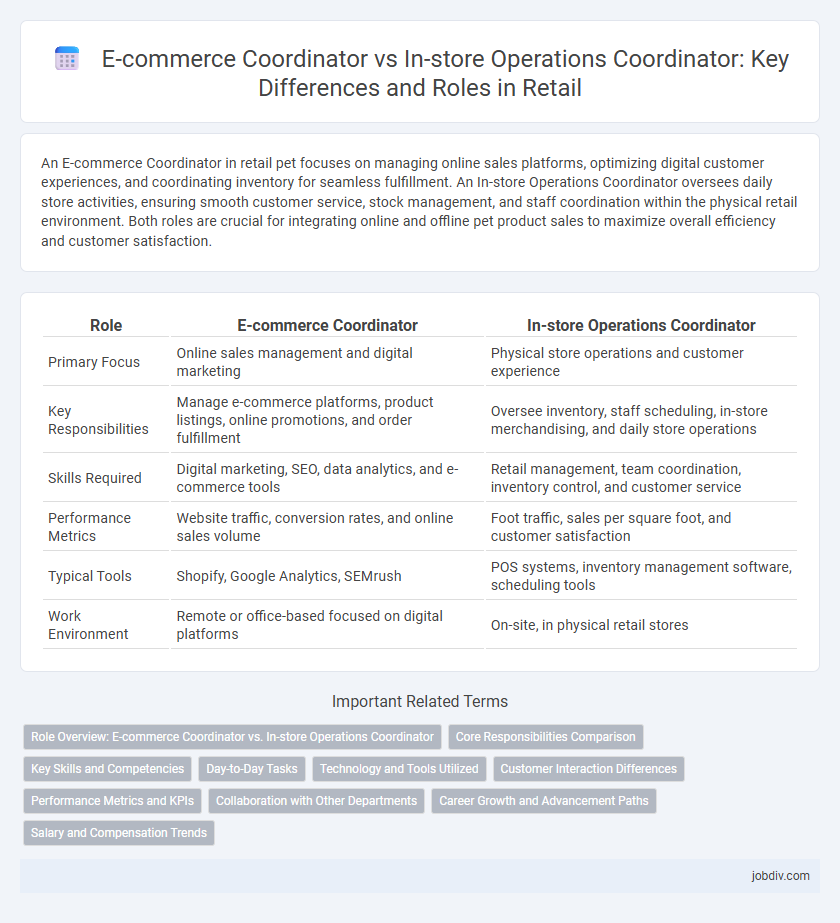An E-commerce Coordinator in retail pet focuses on managing online sales platforms, optimizing digital customer experiences, and coordinating inventory for seamless fulfillment. An In-store Operations Coordinator oversees daily store activities, ensuring smooth customer service, stock management, and staff coordination within the physical retail environment. Both roles are crucial for integrating online and offline pet product sales to maximize overall efficiency and customer satisfaction.
Table of Comparison
| Role | E-commerce Coordinator | In-store Operations Coordinator |
|---|---|---|
| Primary Focus | Online sales management and digital marketing | Physical store operations and customer experience |
| Key Responsibilities | Manage e-commerce platforms, product listings, online promotions, and order fulfillment | Oversee inventory, staff scheduling, in-store merchandising, and daily store operations |
| Skills Required | Digital marketing, SEO, data analytics, and e-commerce tools | Retail management, team coordination, inventory control, and customer service |
| Performance Metrics | Website traffic, conversion rates, and online sales volume | Foot traffic, sales per square foot, and customer satisfaction |
| Typical Tools | Shopify, Google Analytics, SEMrush | POS systems, inventory management software, scheduling tools |
| Work Environment | Remote or office-based focused on digital platforms | On-site, in physical retail stores |
Role Overview: E-commerce Coordinator vs. In-store Operations Coordinator
An E-commerce Coordinator manages online sales platforms, ensuring seamless digital customer experiences, inventory accuracy, and order fulfillment logistics. In contrast, an In-store Operations Coordinator oversees daily retail store functions, including staff scheduling, visual merchandising, and maintaining store compliance with corporate standards. Both roles require coordination skills but focus on distinct channels--digital versus physical retail environments.
Core Responsibilities Comparison
E-commerce Coordinators manage online sales platforms, oversee product listings, coordinate digital marketing efforts, and analyze web traffic data to optimize online customer experiences. In-store Operations Coordinators focus on physical store management, including inventory control, staff scheduling, visual merchandising, and ensuring compliance with retail safety standards. Both roles require coordination skills, but E-commerce emphasizes digital channel optimization, whereas In-store Operations centers on enhancing the brick-and-mortar customer journey.
Key Skills and Competencies
E-commerce Coordinators excel in digital marketing, data analytics, and customer experience management, leveraging SEO, Google Analytics, and inventory platforms to drive online sales and optimize user engagement. In contrast, In-store Operations Coordinators prioritize team leadership, visual merchandising, and supply chain logistics, ensuring efficient store operations, stock replenishment, and enhanced in-person customer service. Both roles require strong communication and problem-solving skills, but technical proficiency in online tools differentiates the e-commerce position from the hands-on, operational focus of in-store coordination.
Day-to-Day Tasks
E-commerce Coordinators manage online product listings, monitor digital inventory levels, and coordinate order fulfillment with warehouses to ensure timely delivery. In-store Operations Coordinators oversee daily store activities, including staff scheduling, merchandising, and customer service operations to maintain a smooth retail environment. Both roles require strong communication skills but differ in their focus on digital storefront management versus physical store operations.
Technology and Tools Utilized
E-commerce Coordinators primarily utilize digital platforms such as Shopify, Magento, and Google Analytics to manage online product listings, track consumer behavior, and optimize user experience through data-driven insights. In contrast, In-store Operations Coordinators rely heavily on point-of-sale (POS) systems like Square or Lightspeed and inventory management software to streamline in-store transactions and stock control. Both roles require proficiency in ERP systems, but E-commerce Coordinators emphasize online marketing tools like SEO software, whereas In-store Coordinators focus on workforce scheduling and physical store layout technologies.
Customer Interaction Differences
E-commerce Coordinators primarily manage online customer interactions through digital channels like email, live chat, and social media, ensuring timely responses and seamless virtual shopping experiences. In-store Operations Coordinators engage directly with customers face-to-face, handling inquiries, resolving issues on-site, and enhancing the physical retail environment. The key difference lies in the mode of communication, with e-commerce roles emphasizing virtual engagement and in-store coordinators focusing on personal, immediate customer service.
Performance Metrics and KPIs
E-commerce Coordinators prioritize digital performance metrics such as website traffic, conversion rates, cart abandonment rates, and average order value to optimize online sales channels. In-store Operations Coordinators focus on KPIs like customer footfall, shelf availability, inventory turnover, and in-store sales performance to enhance the retail experience and operational efficiency. Both roles require data-driven decision-making but apply distinct metrics aligned with their respective environments to drive revenue growth and customer satisfaction.
Collaboration with Other Departments
An E-commerce Coordinator collaborates closely with marketing, IT, and logistics teams to ensure seamless online sales and timely order fulfillment. In contrast, an In-store Operations Coordinator works directly with store managers, inventory, and visual merchandising departments to maintain efficient in-store workflows and enhance customer experience. Both roles require cross-departmental communication, but the E-commerce Coordinator emphasizes digital platforms while the In-store Coordinator focuses on physical retail operations.
Career Growth and Advancement Paths
E-commerce Coordinators often experience rapid career growth through digital marketing, data analytics, and supply chain management roles, fueled by the booming online retail sector. In-store Operations Coordinators typically advance by honing expertise in inventory control, customer service optimization, and team leadership within a physical retail environment. Both paths offer distinct opportunities, with e-commerce roles leaning towards technological and strategic development, while in-store positions emphasize operational efficiency and direct customer engagement.
Salary and Compensation Trends
E-commerce Coordinators typically command salaries ranging from $45,000 to $65,000 annually, reflecting the growing importance of digital retail channels and specialized skills in online sales platforms. In-store Operations Coordinators earn between $40,000 and $60,000, often supplemented by bonuses linked to store performance metrics and customer service targets. Compensation trends indicate a rising premium on e-commerce roles due to the shift toward online shopping and the integration of advanced analytics and digital marketing strategies.
E-commerce Coordinator vs In-store Operations Coordinator Infographic

 jobdiv.com
jobdiv.com